The Daily Shot: 06-Oct-23
• The United States
• Canada
• The United Kingdom
• The Eurozone
• Japan
• China
• Emerging Markets
• Cryptocurrency
• Commodities
• Energy
• Equities
• Credit
• Rates
• Global Developments
• Food for Thought
The United States
1. Let’s begin with the labor market.
• Initial jobless claims are nearing multi-year lows for this time of the year.
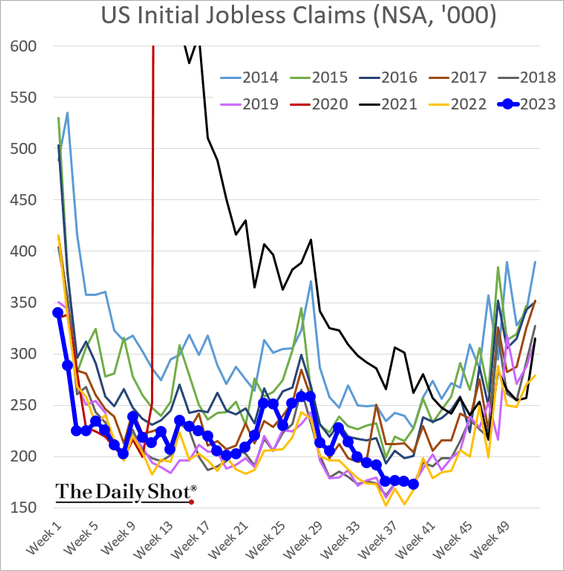
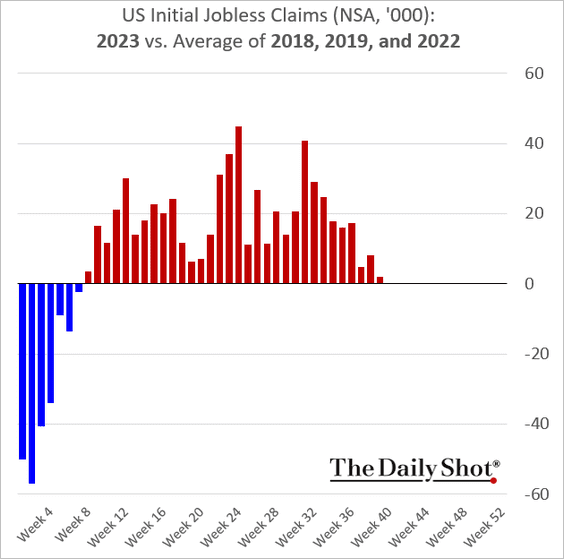
– Continuing claims are holding steady relative to the average of 2018, 2019, and 2022.
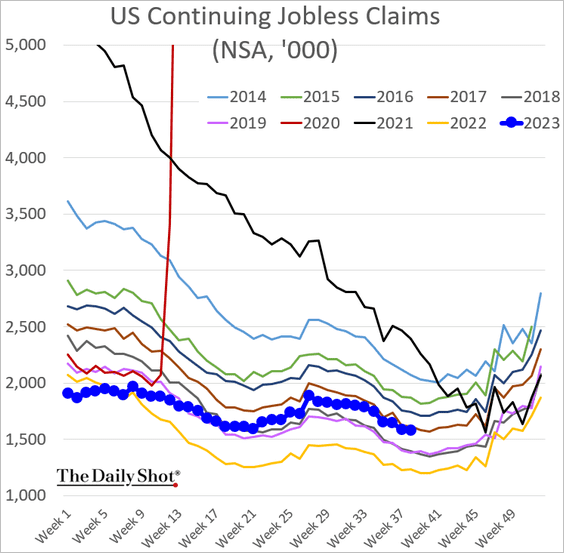
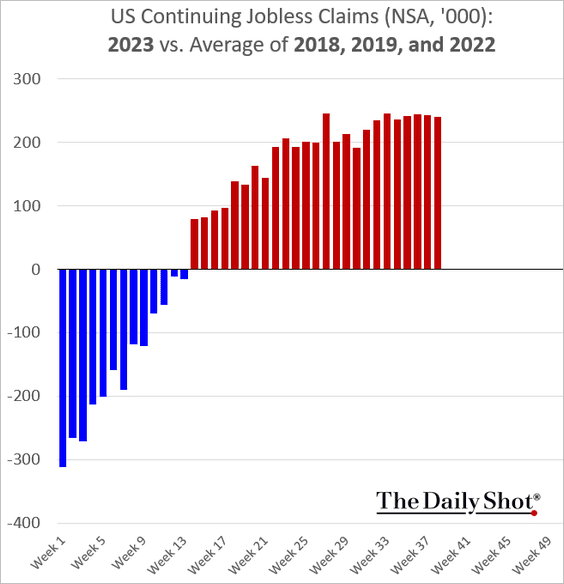
• Job cut announcements eased last month and are back at pre-COVID levels.
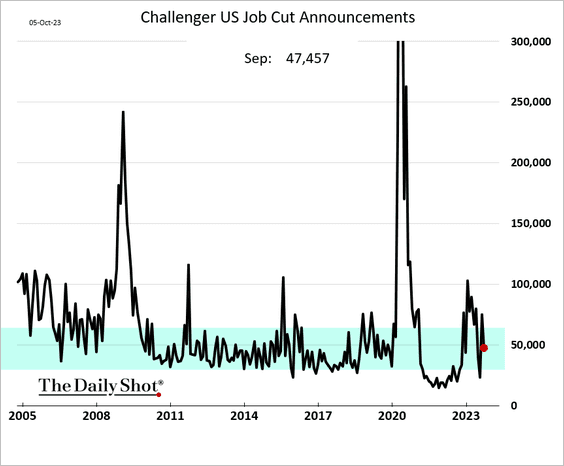
• The NFIB small business survey suggests that payrolls are not rolling over just yet.
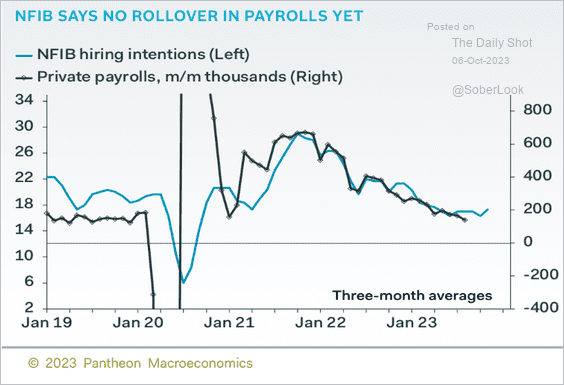 Source: Pantheon Macroeconomics
Source: Pantheon Macroeconomics
• Will the labor force participation rate of women in the US match that of the other G7 countries by the end of the decade?
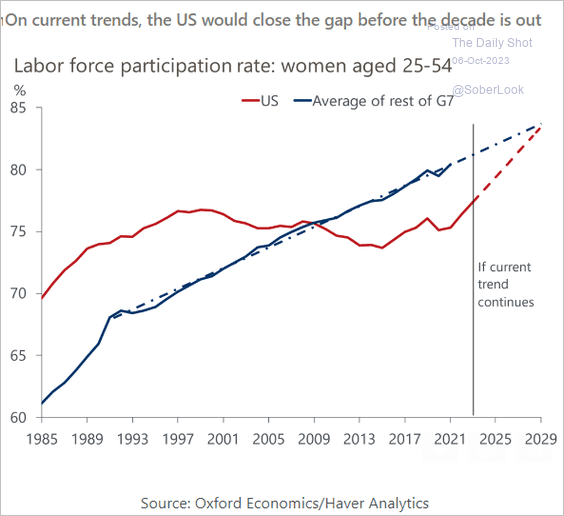 Source: Oxford Economics
Source: Oxford Economics
——————–
2. Next, let’s take a look at some consumer-related trends.
• Households’ excess savings have been revised higher (2 charts). Consumer spending could have a longer runway than implied by earlier projections.
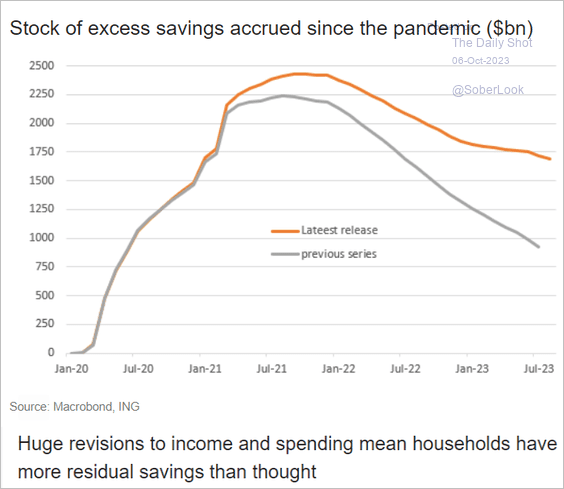 Source: ING
Source: ING
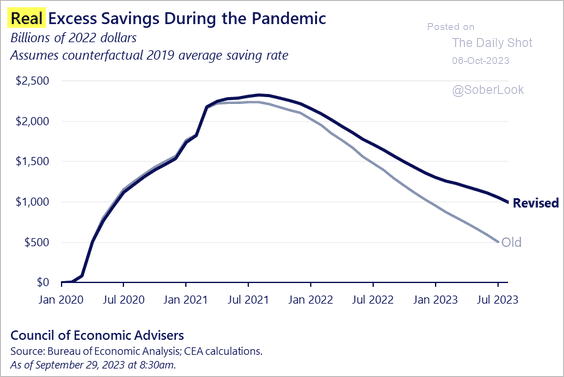 Source: The White House Read full article
Source: The White House Read full article
• Goods consumption is no longer declining relative to services.
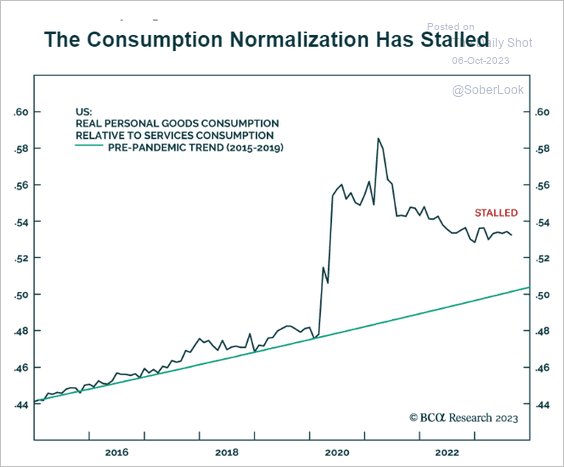 Source: BCA Research
Source: BCA Research
• The overall net worth of households remains buoyant.
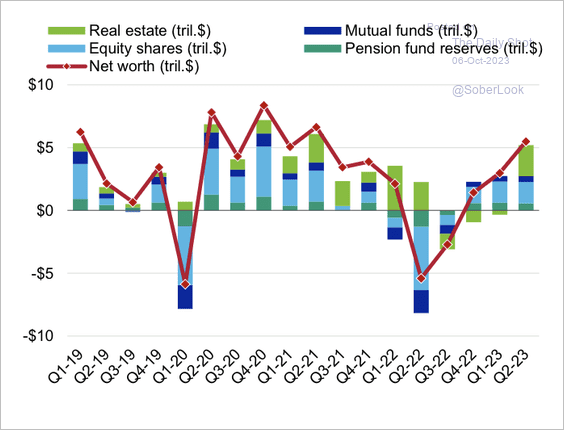 Source: Moody’s Investors Service
Source: Moody’s Investors Service
• Retail sales growth for lower-income consumers has been remarkably strong.
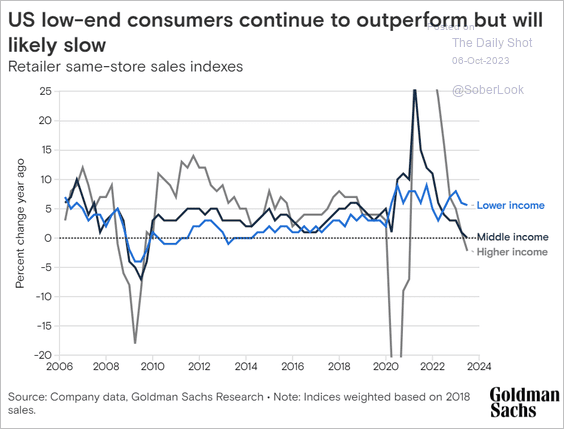 Source: Goldman Sachs
Source: Goldman Sachs
• Student loan payments are running at pre-COVID levels.
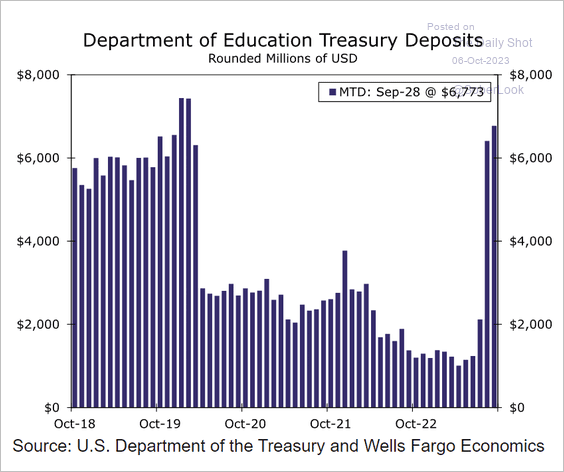 Source: Wells Fargo Securities
Source: Wells Fargo Securities
——————–
3. The trade deficit continues to narrow.
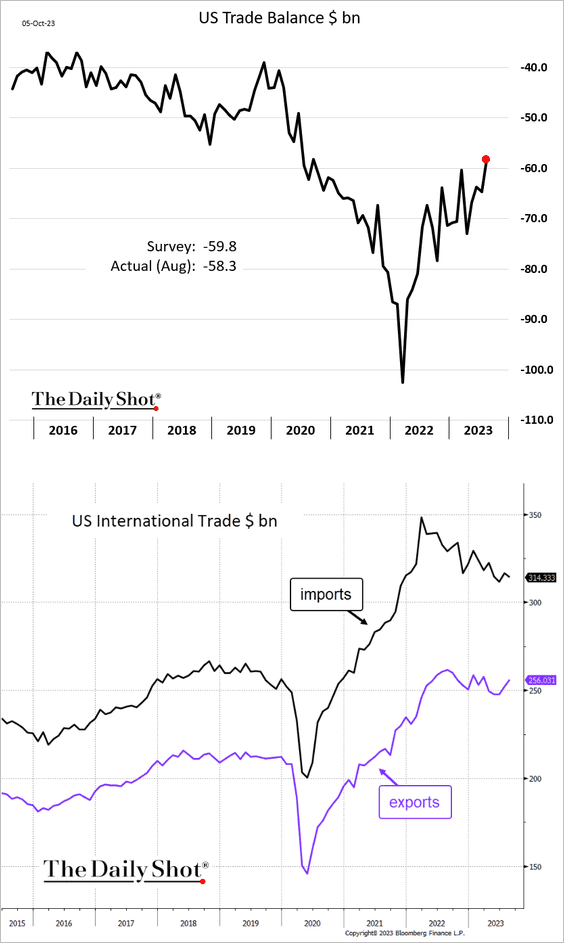 Source: @TheTerminal, Bloomberg Finance L.P.
Source: @TheTerminal, Bloomberg Finance L.P.
Back to Index
Canada
1. Canada’s trade balance unexpectedly swung into surplus.
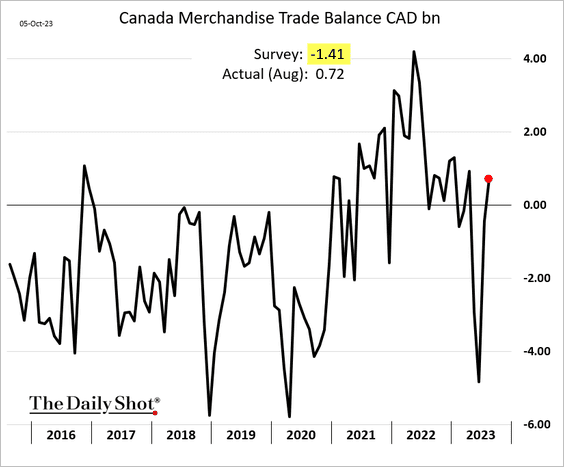
 Source: Reuters Read full article
Source: Reuters Read full article
——————–
2. The Ivey PMI suggests that business activity remains in growth mode.
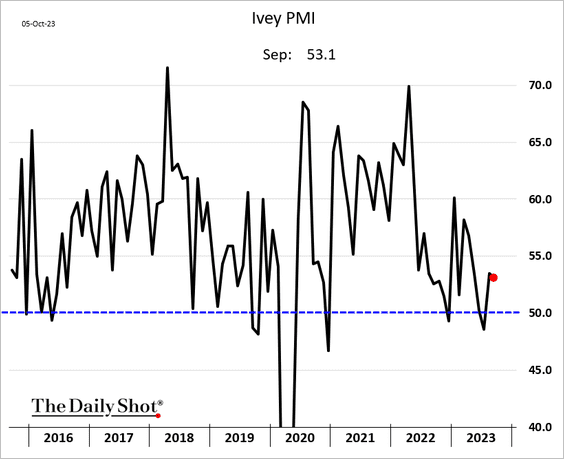
3. Canada stands to substantially increase crude oil exports next year after the Trans Mountain pipeline capacity is expanded.
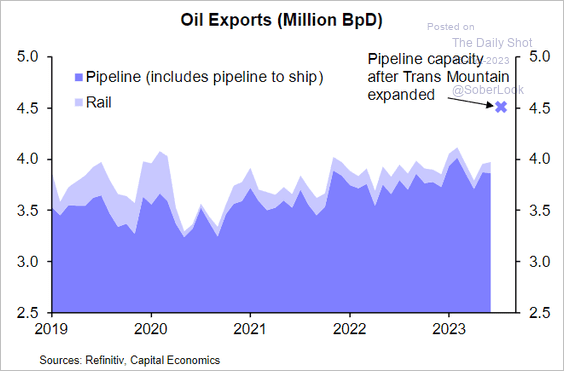 Source: Capital Economics
Source: Capital Economics
Back to Index
The United Kingdom
1. Construction activity is sinking, …
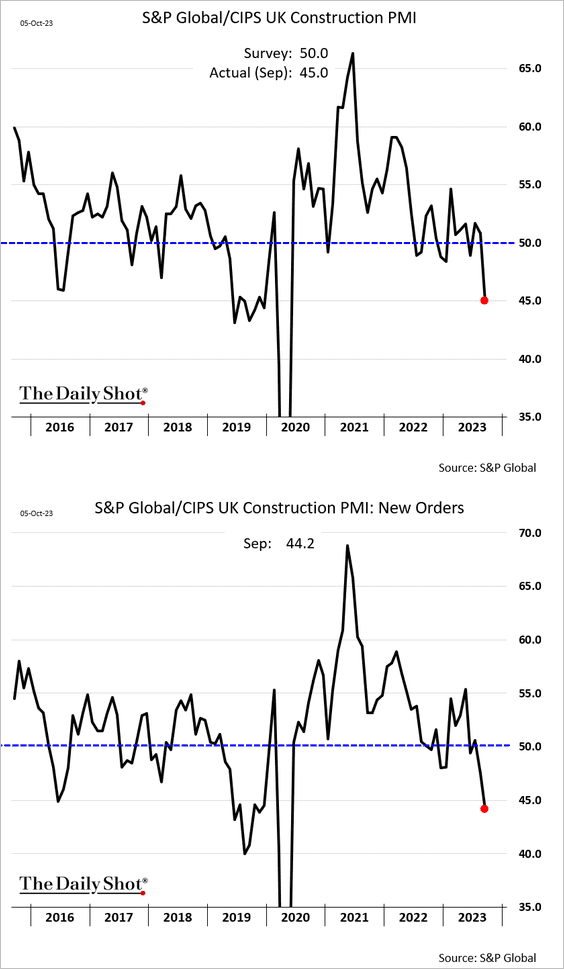
… dragged lower by crashing residential demand.
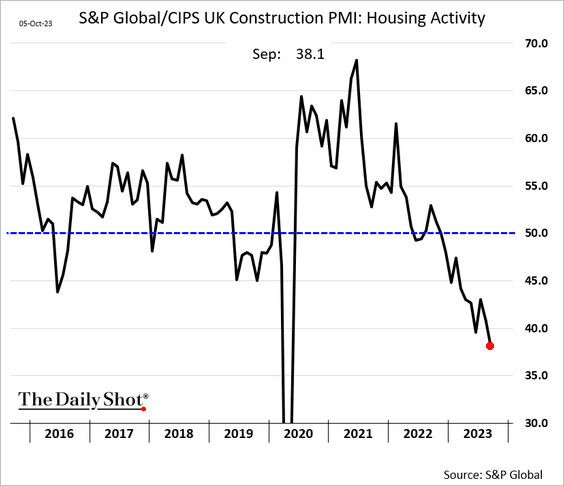
 Source: Reuters Read full article
Source: Reuters Read full article
——————–
2. New car registrations remain well above last year’s levels.
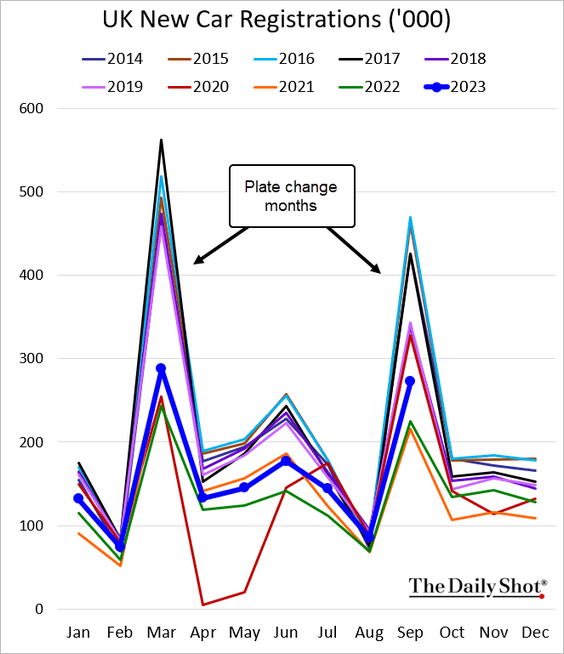
3. Here is a look at UK carbon emission contract prices vs. the EU.
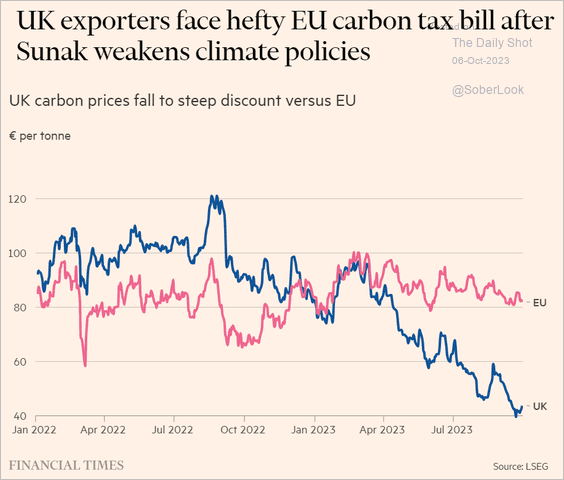 Source: @financialtimes Read full article
Source: @financialtimes Read full article
Back to Index
The Eurozone
1. Germany’s trade surplus declined in August but was higher than expected.
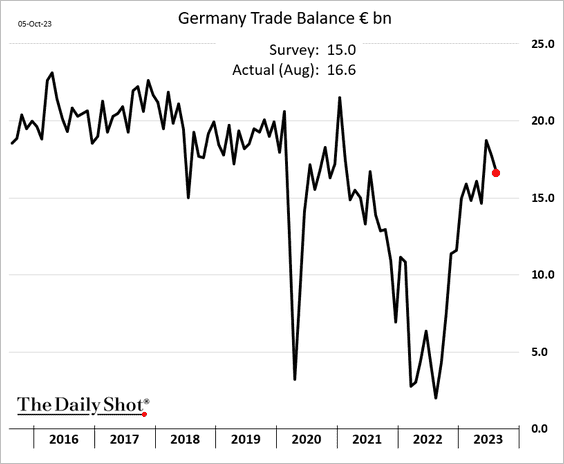
Exports are slowing.
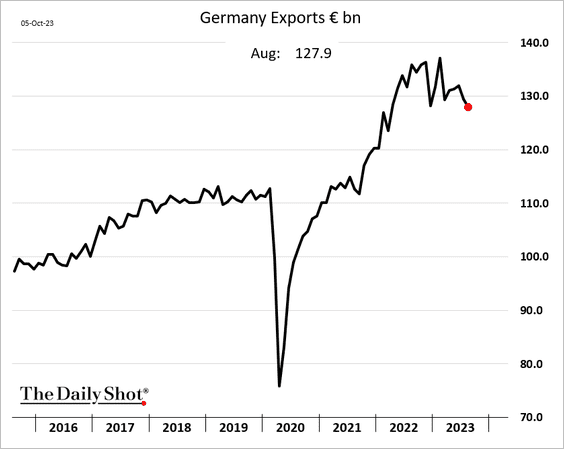
——————–
2. The Eurozone’s construction activity continues to shrink.
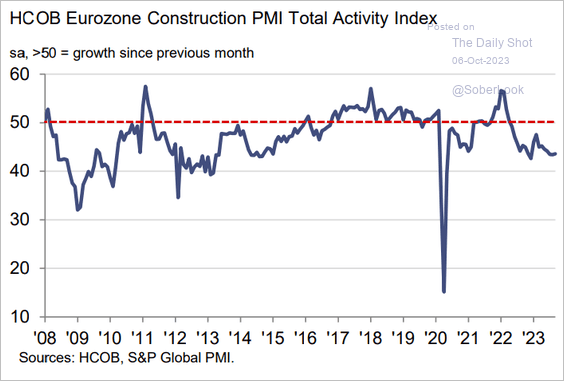 Source: S&P Global PMI
Source: S&P Global PMI
While the French construction PMI has been soft, …
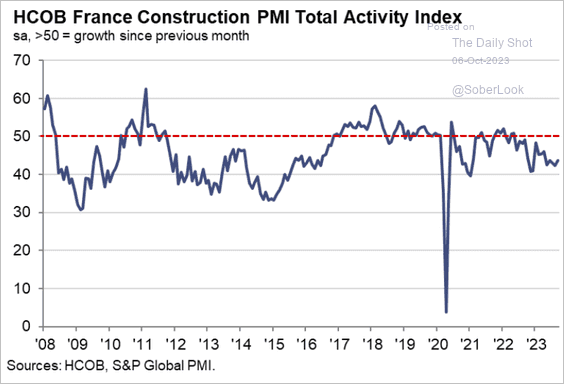 Source: S&P Global PMI
Source: S&P Global PMI
… Germany’s construction sector is under severe pressure, …

… as demand collapses.
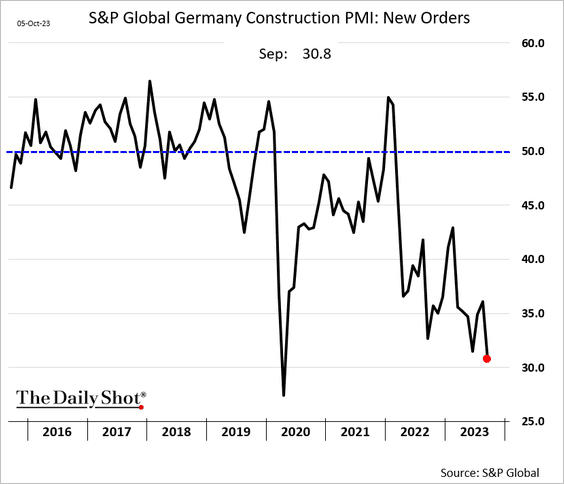
Real estate insolvencies are rising.
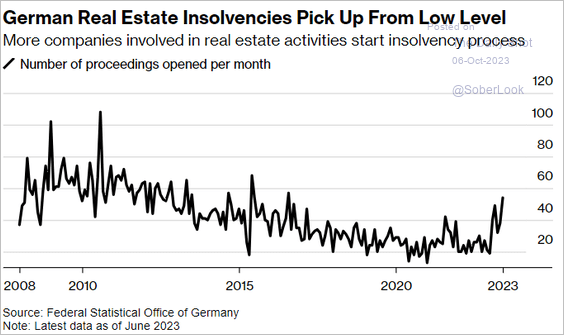 Source: @markets Read full article
Source: @markets Read full article
 Source: The Economist Read full article
Source: The Economist Read full article
——————–
3. French manufacturing output eased in August but remains on an upward trajectory (though still below pre-COVID levels).
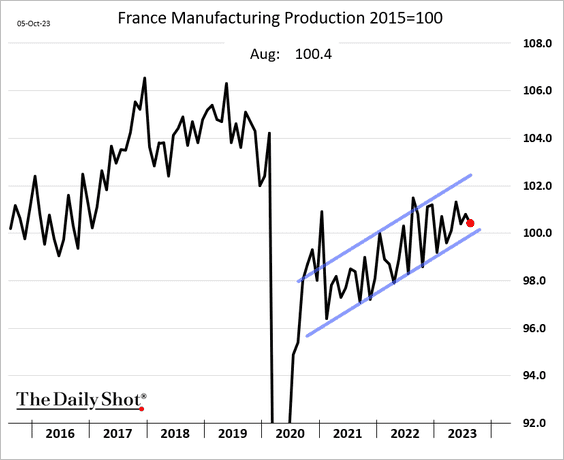
Spain’s industrial production is rolling over.
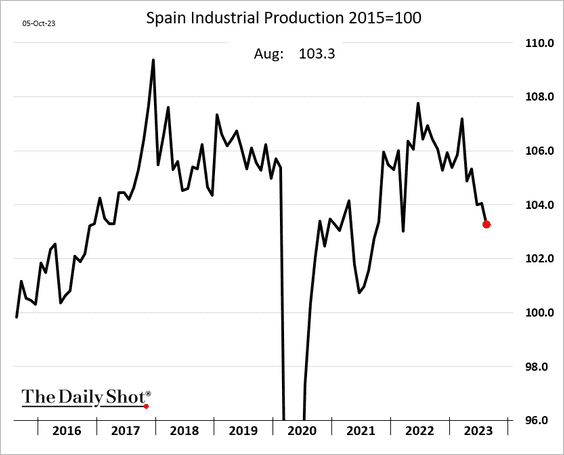
——————–
4. Here is Danske Bank’s euro-area growth tracker.
![]() Source: Danske Bank
Source: Danske Bank
5. Has wage growth peaked?
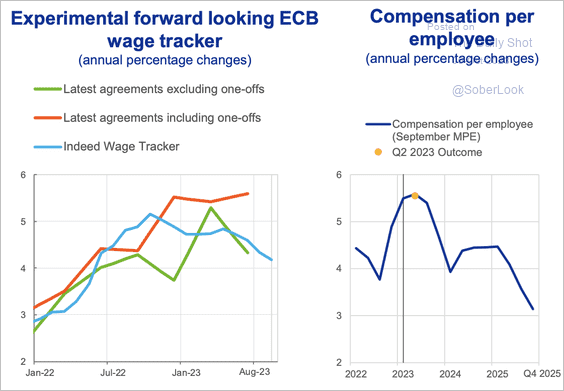 Source: ECB Read full article
Source: ECB Read full article
6. Longer-dated debt rout has been remarkable. The Austrian 100-year bond is down 74% from the peak.
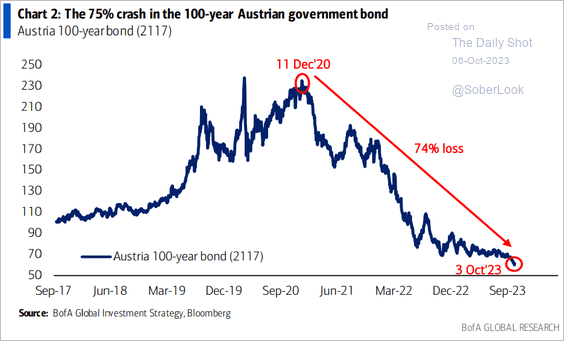 Source: BofA Global Research
Source: BofA Global Research
Back to Index
Japan
1. Wage growth was below forecasts in August, with real wages holding well below last year’s levels.
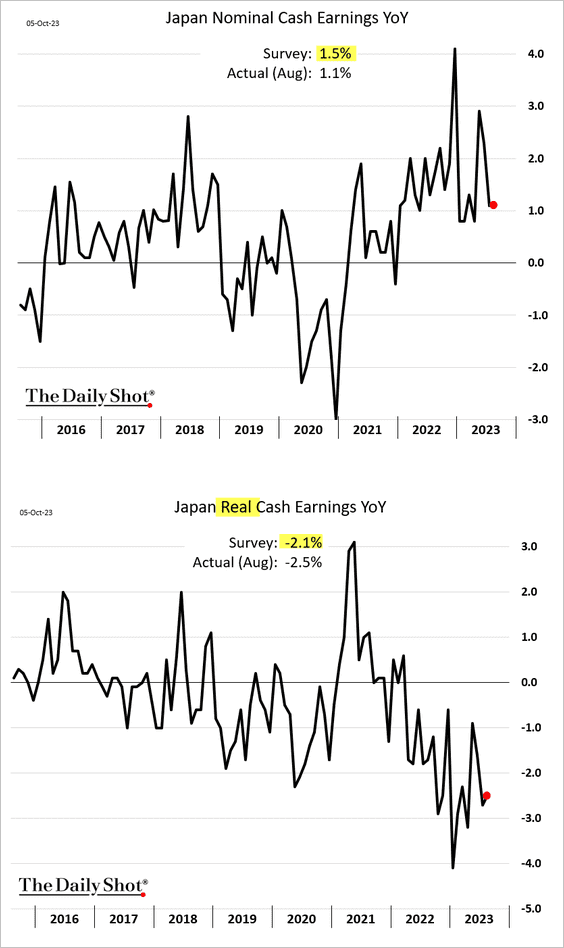
 Source: @economics Read full article
Source: @economics Read full article
——————–
2. Household spending topped expectations.
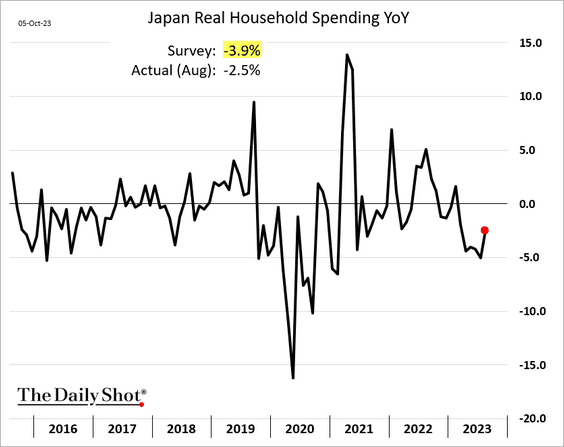
Back to Index
China
1. Retail sales volumes declined in September, particularly luxury.
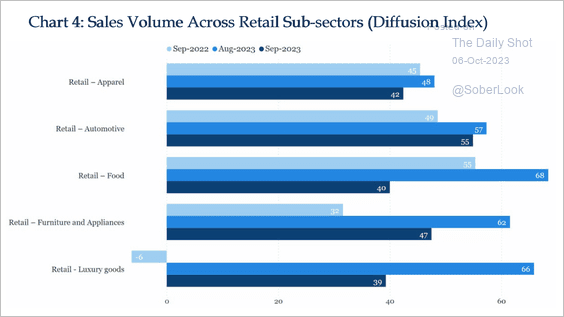 Source: China Beige Book
Source: China Beige Book
2. Suppliers for real estate developers are seeing a spike in account receivables.
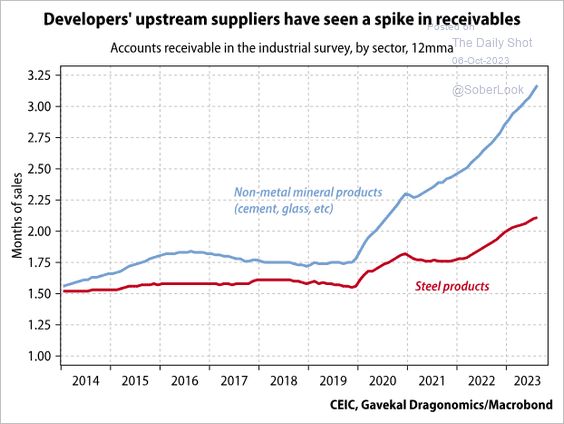 Source: Gavekal Research
Source: Gavekal Research
3. Here is a look at equity indices for China and Japan (in USD terms).
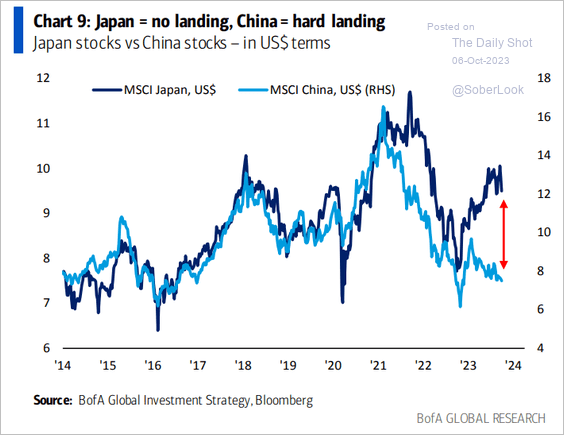 Source: BofA Global Research
Source: BofA Global Research
Back to Index
Emerging Markets
1. Let’s begin with Mexico.
• Stocks tumbled after the news on airport fees.
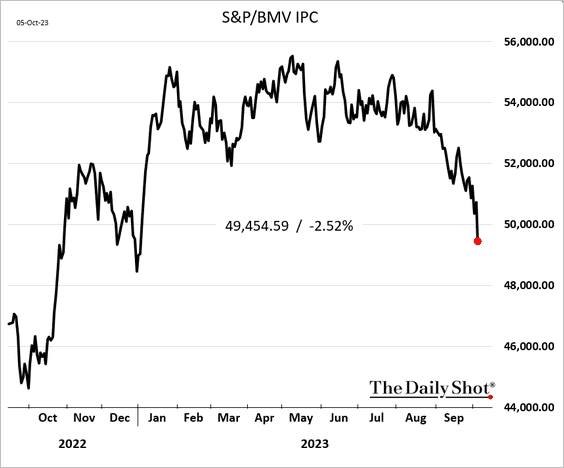
 Source: @markets Read full article
Source: @markets Read full article
– USD/MXN is now well above the 200-day moving average.
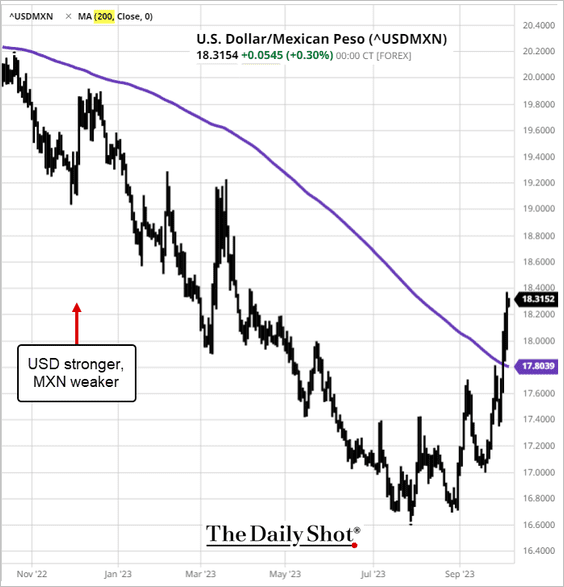
The peso implied volatility surged.
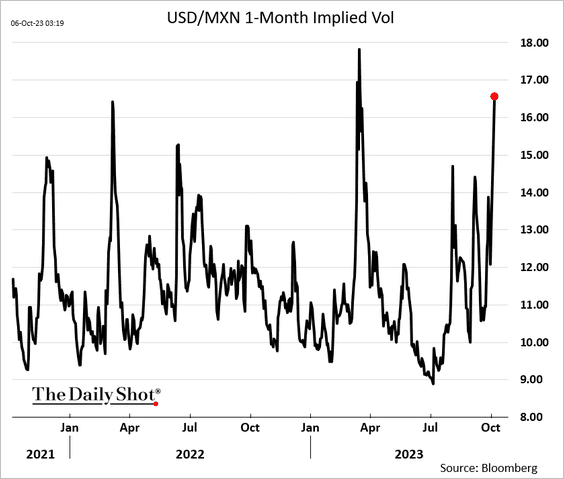
• Consumer confidence remains robust.
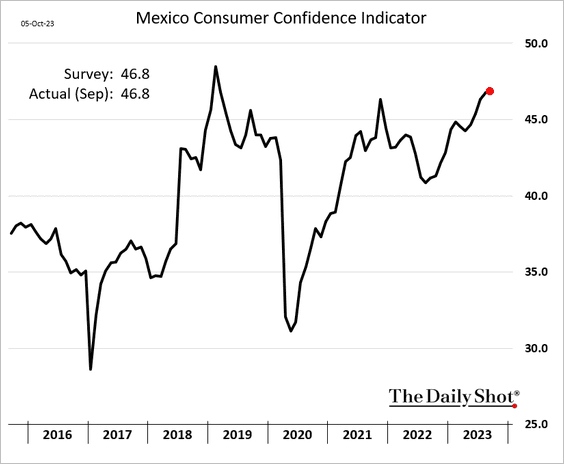
——————–
2. Peru’s central bank cut rates again.
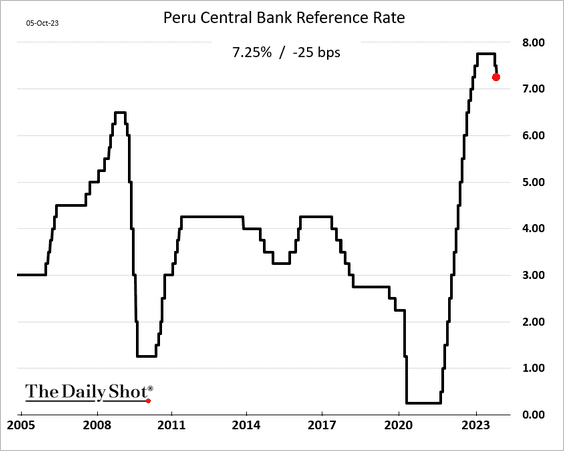
 Source: @economics Read full article
Source: @economics Read full article
——————–
3. Chile’s wage growth is rolling over.
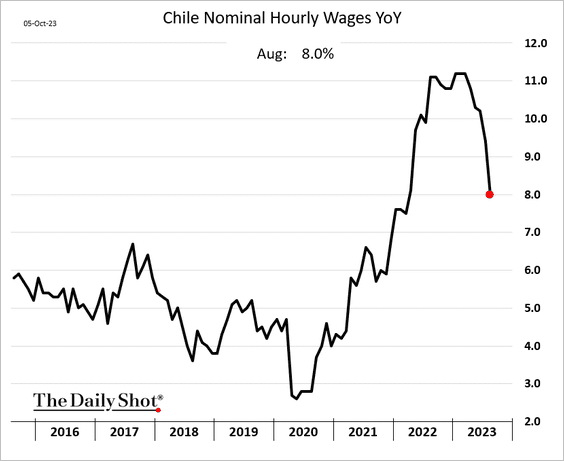
4. Argentina’s manufacturing output is slowing.
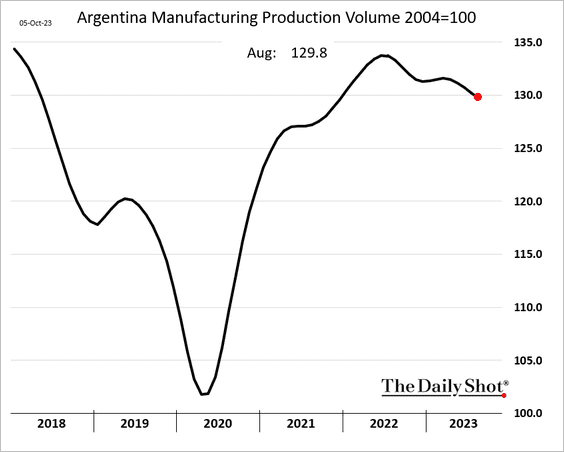
5. India’s service sector growth remains remarkably strong.
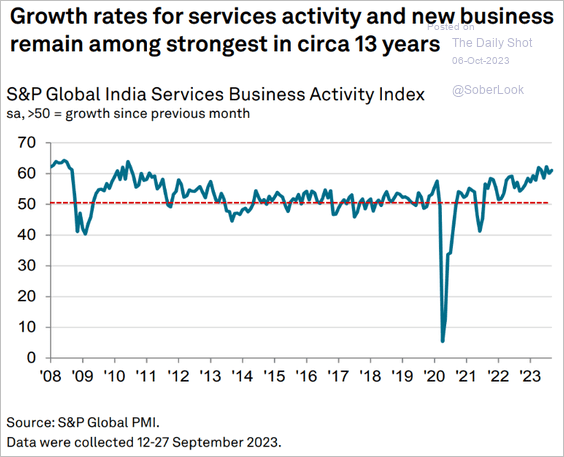 Source: S&P Global PMI
Source: S&P Global PMI
6. South Africa’s electricity production is at multi-year lows, putting pressure on economic growth.
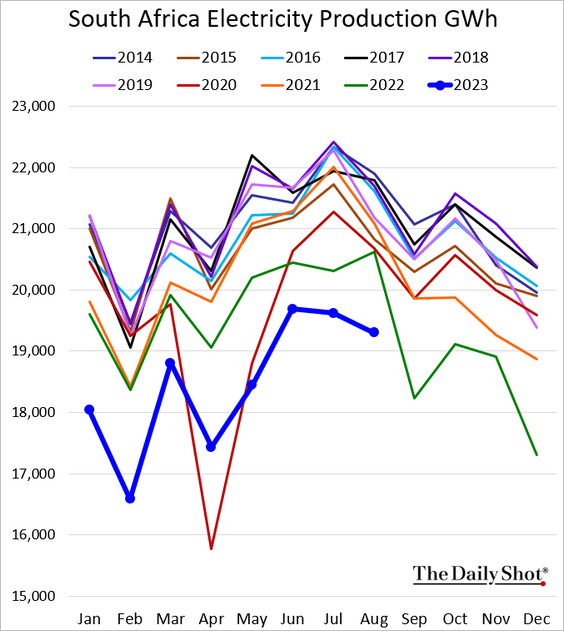
Back to Index
Cryptocurrency
1. It has been a mixed week for cryptos, with BTC and XRP outperforming ETH.
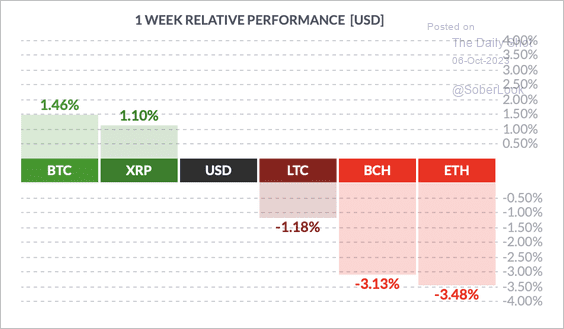 Source: FinViz
Source: FinViz
2. Bitcoin’s put/call ratio ticked higher over the past week.
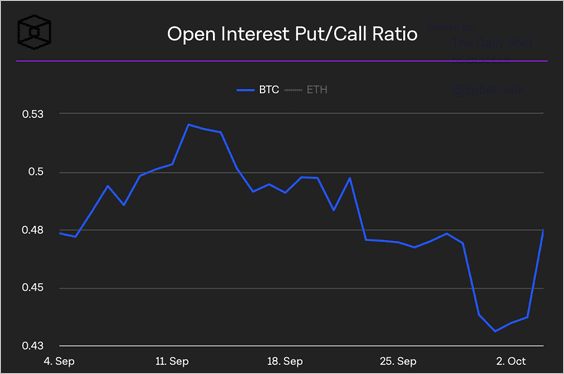 Source: The Block
Source: The Block
• Bitcoin’s implied volatility remains historically low.
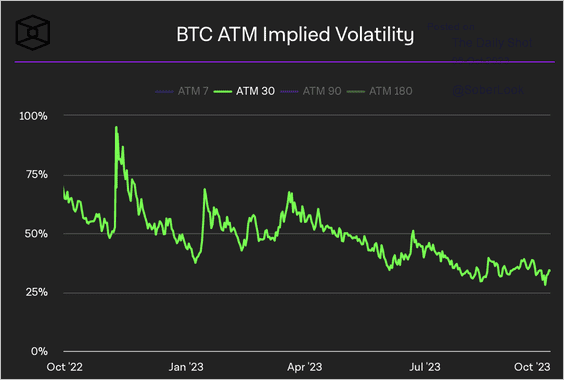 Source: The Block
Source: The Block
——————–
3. This chart shows the most “crypto-obsessed” countries.
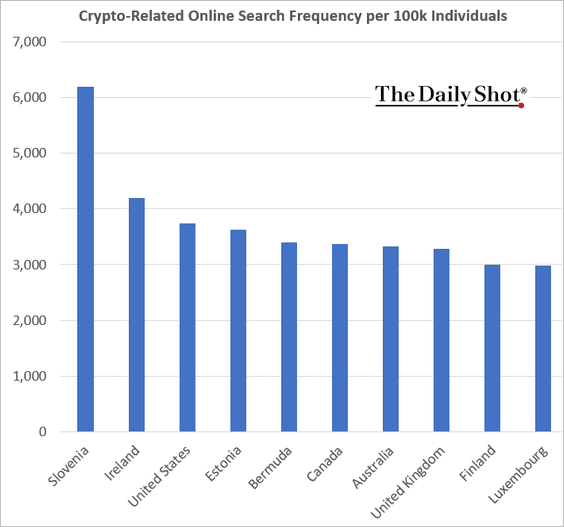 Source: Marketplacefairness.org
Source: Marketplacefairness.org
Back to Index
Commodities
Gold entered a death cross and is now firmly in oversold territory.
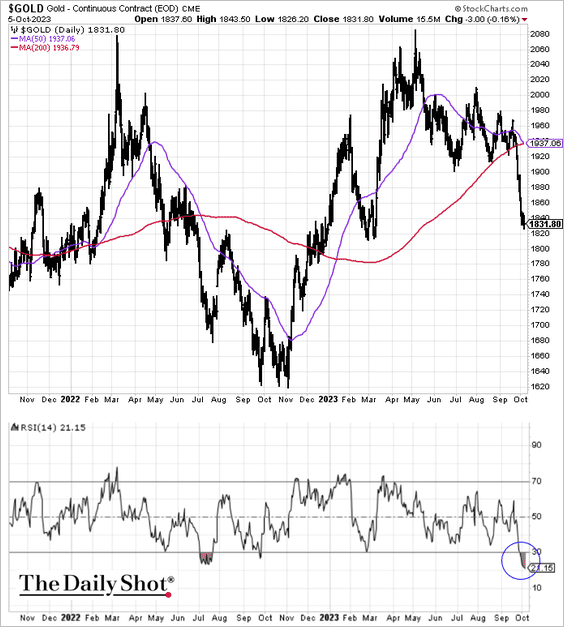
Back to Index
Energy
1. Crude oil entered correction territory, with Brent down 10.9% from the peak.
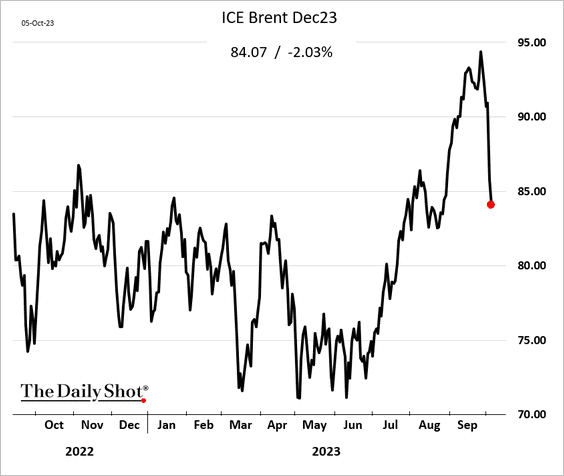
• It has been a rough week so far.
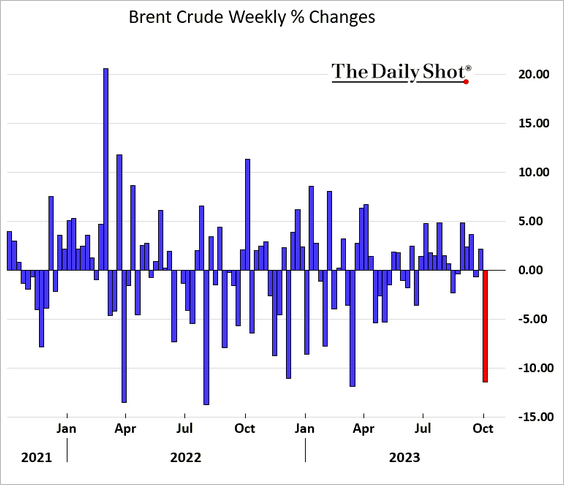
• Oil implied volatility jumped in recent days.
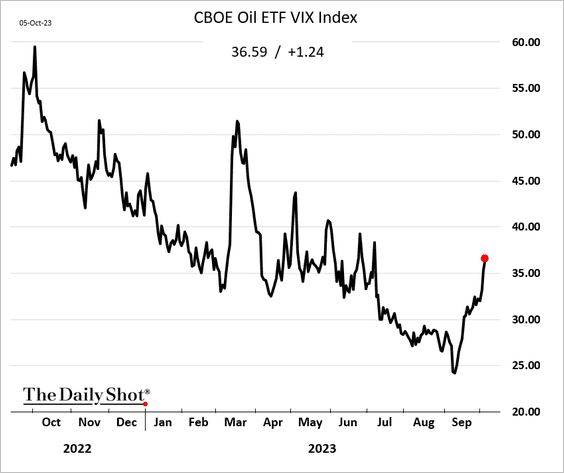
——————–
2. US retail gasoline prices are headed lower.
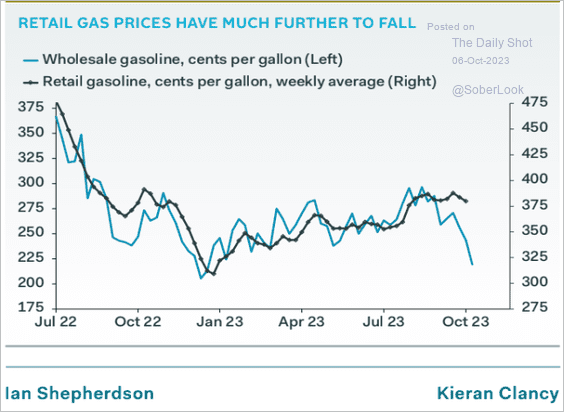 Source: Pantheon Macroeconomics
Source: Pantheon Macroeconomics
3. OPEC has plenty of spare capacity (2 charts).
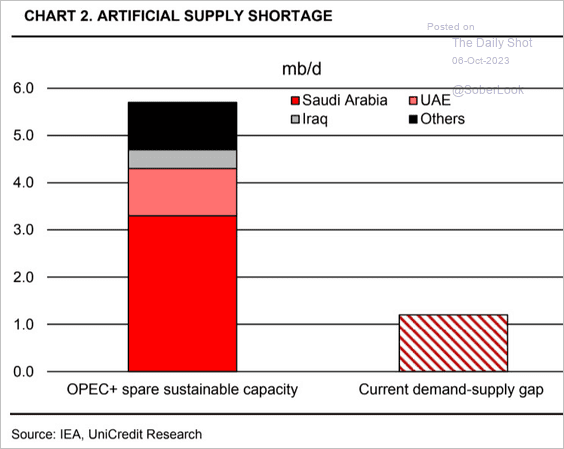 Source: UniCredit; @dailychartbook
Source: UniCredit; @dailychartbook
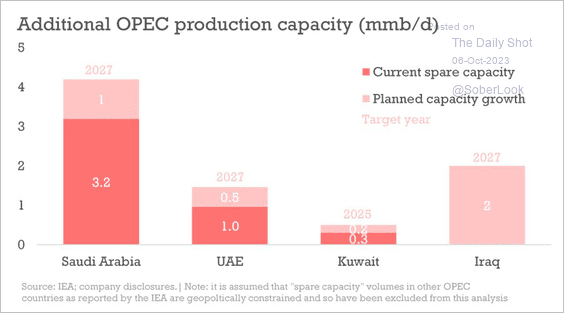 Source: IEA; @harryhhutch
Source: IEA; @harryhhutch
——————–
3. US natural gas futures jumped …
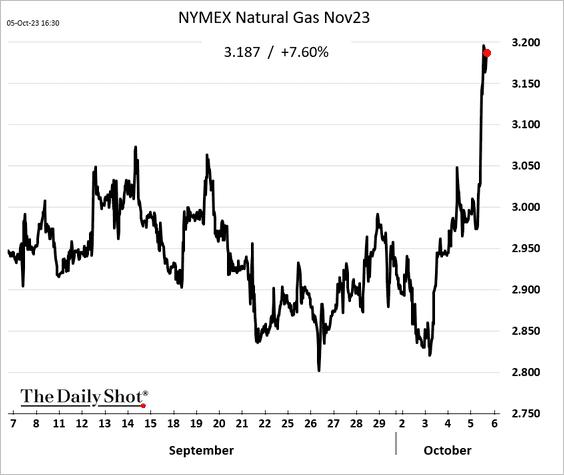
… in response to smaller-than-expected storage injection (2 charts).
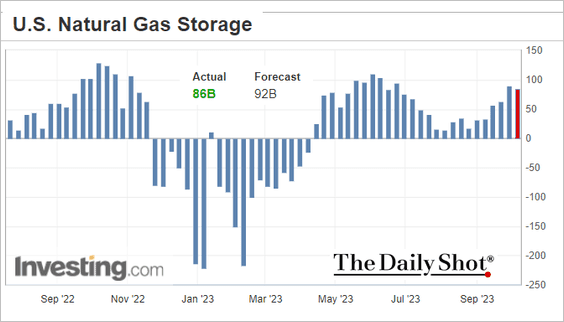
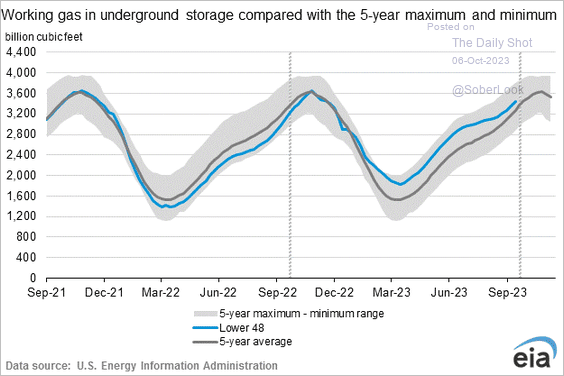
 Source: barchart.com Read full article
Source: barchart.com Read full article
• Increasing LNG exports could keep US natural gas prices elevated next year.
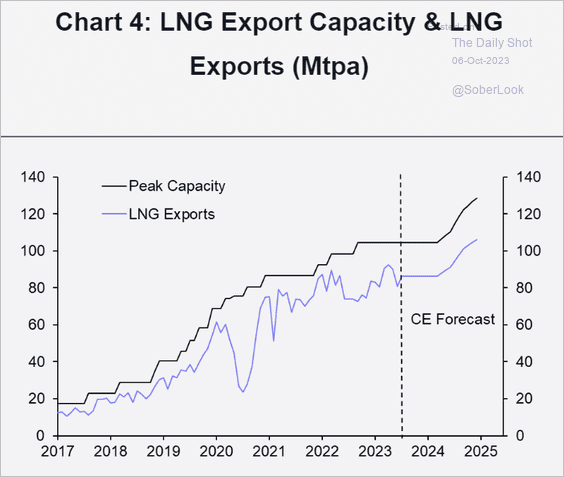 Source: Capital Economics
Source: Capital Economics
Back to Index
Equities
1. Here is a look at some sectors that have struggled this year.
• Retail:
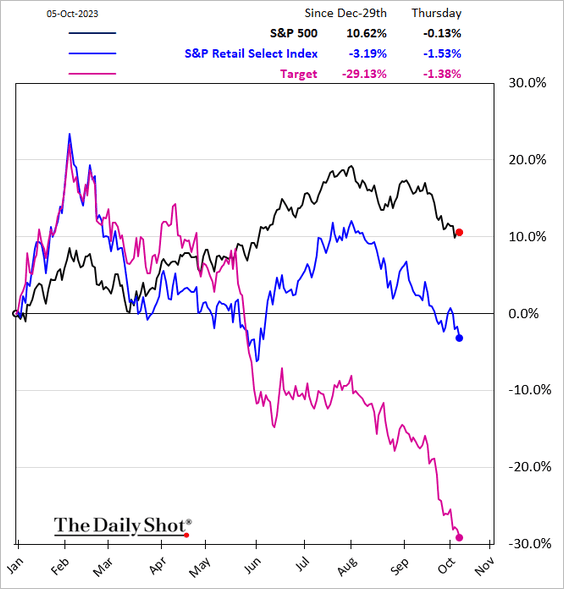
• Consumer staples:
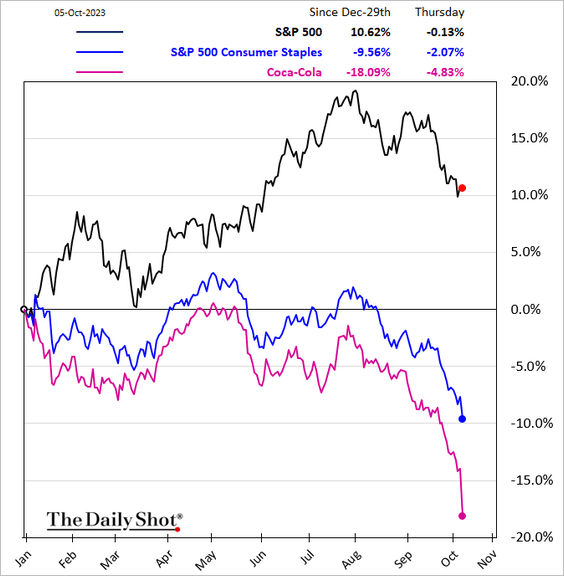
 Source: MarketWatch Read full article
Source: MarketWatch Read full article
• REITs:
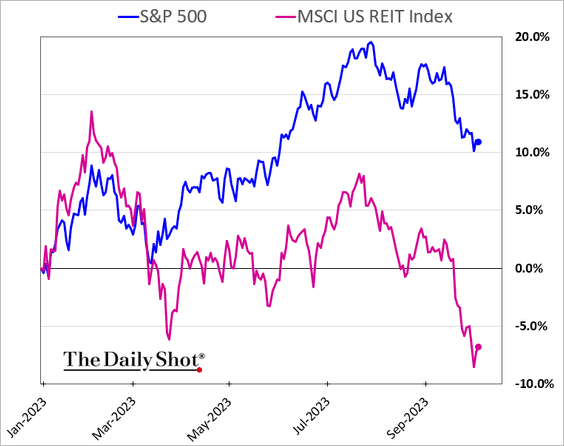
• Biotech:
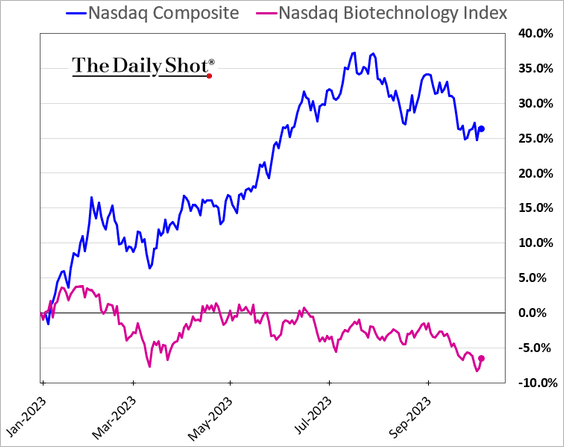
2. Automakers’ shares are under pressure from the UAW strike and GM’s air-bag issue.
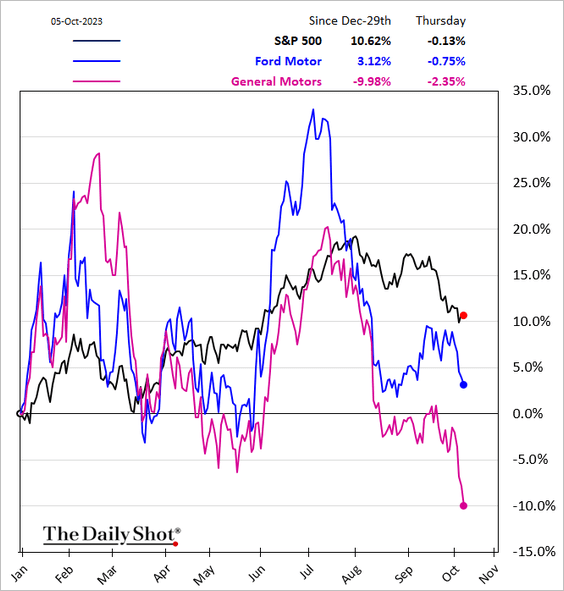
 Source: @WSJ Read full article
Source: @WSJ Read full article
——————–
3. The put-call ratio surged this week, pointing to bearish sentiment.
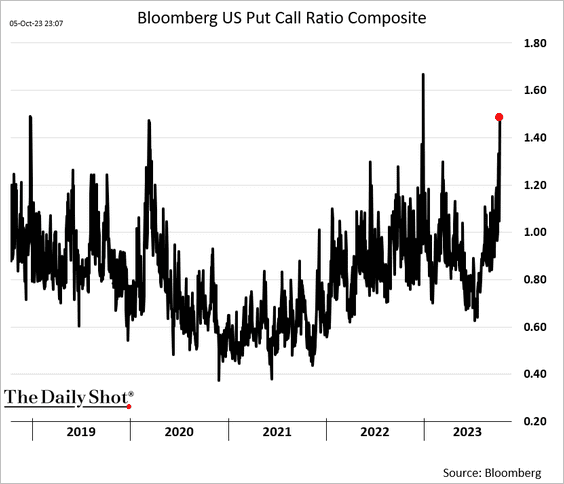
• Investment managers’ positioning has deteriorated sharply.
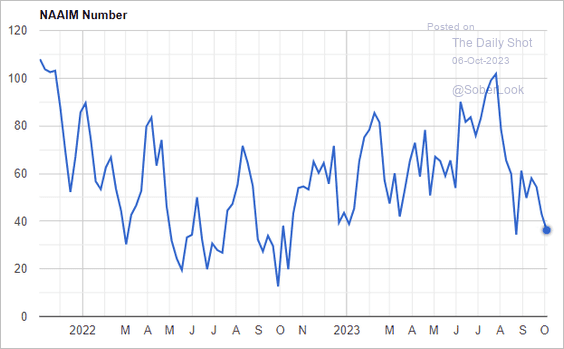 Source: NAAIM
Source: NAAIM
• Hedge funds remain cautious on stocks.
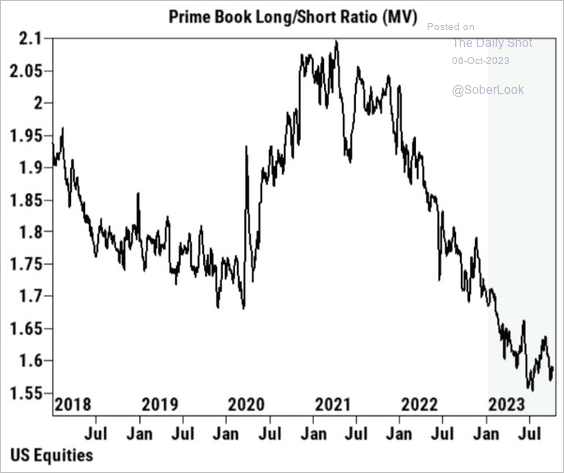 Source: Goldman Sachs; @dailychartbook
Source: Goldman Sachs; @dailychartbook
——————–
4. The S&P 600 (small caps) is nearing support.
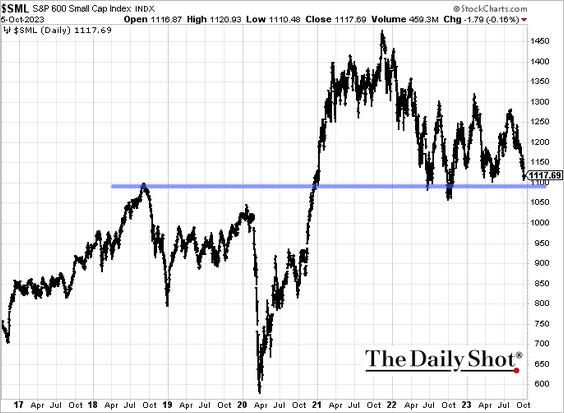
5. If Treasury yields have peaked, we could see a bounce in stocks over the next month.
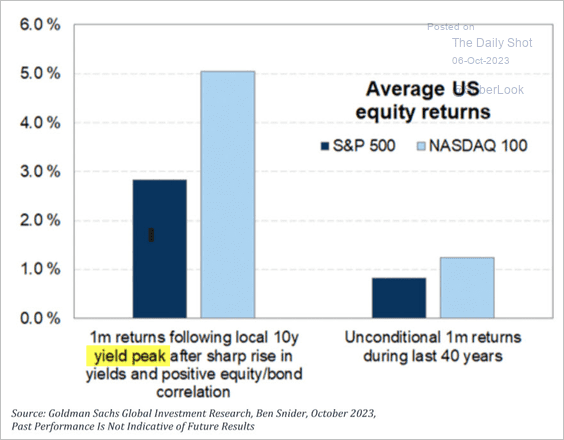 Source: Goldman Sachs; @dailychartbook
Source: Goldman Sachs; @dailychartbook
Back to Index
Credit
1. High-yield funds are seeing outflows.
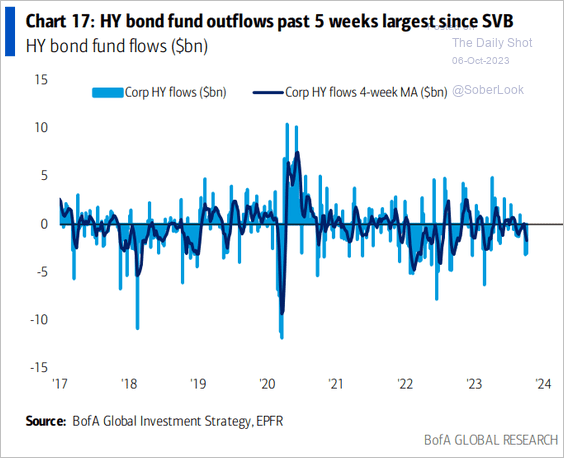 Source: BofA Global Research
Source: BofA Global Research
Leveraged loan fund flows have also turned negative.
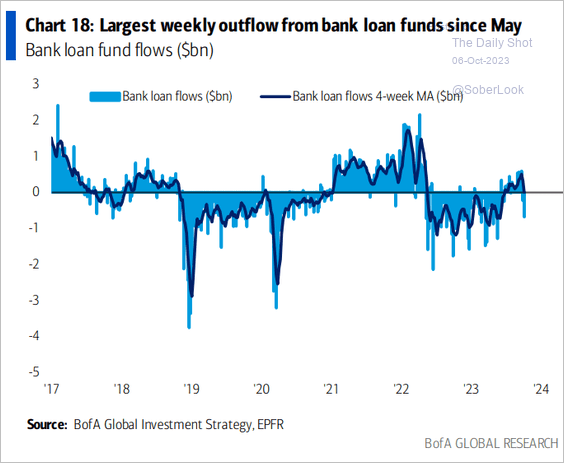 Source: BofA Global Research
Source: BofA Global Research
——————–
2. US small business rent delinquencies is trending higher.
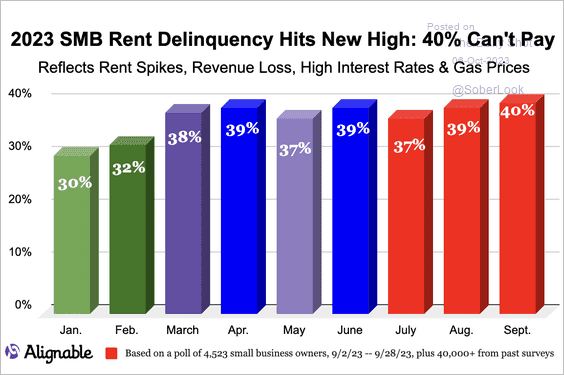 Source: Alignable
Source: Alignable
3. Muni issuance has been slowing.
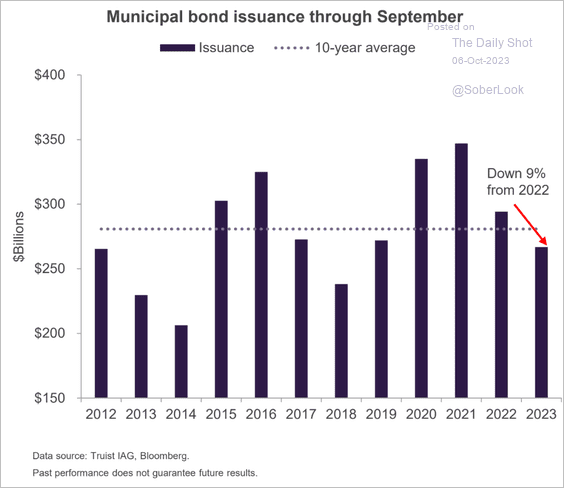 Source: Truist Advisory Services
Source: Truist Advisory Services
4. Here is a look at ESG bond issuance.
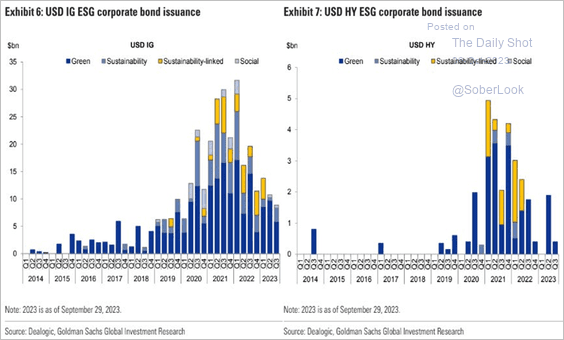 Source: Goldman Sachs; @MikeZaccardi
Source: Goldman Sachs; @MikeZaccardi
5. US money market funds’ AUM continues to surge.
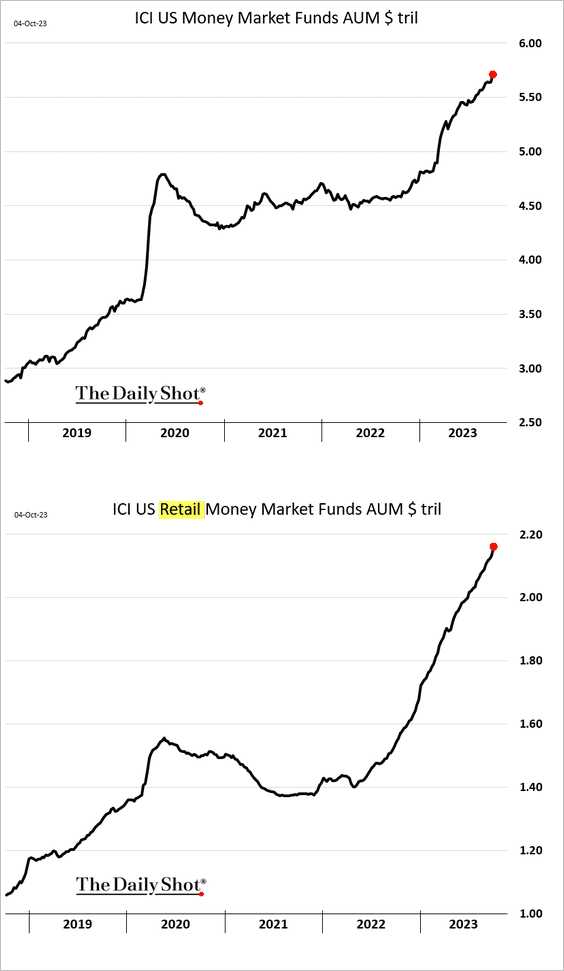
Back to Index
Rates
1. Treasury yields are dislocated, according to JP Morgan.
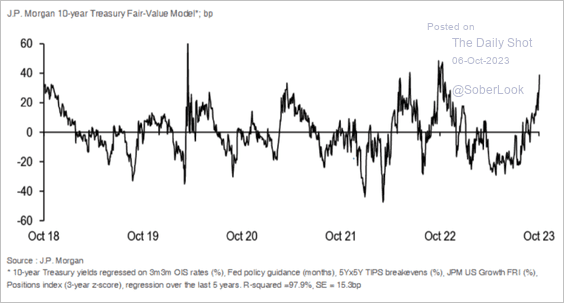 Source: JP Morgan Research; @dailychartbook
Source: JP Morgan Research; @dailychartbook
• The Treasury selloff appears to be overextended.
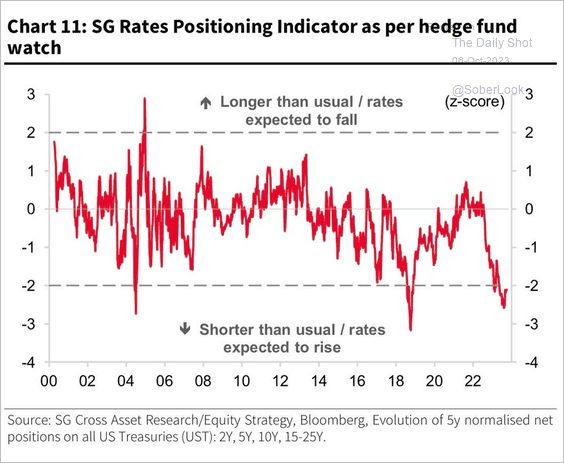 Source: Societe Generale Cross Asset Research; @WallStJesus
Source: Societe Generale Cross Asset Research; @WallStJesus
——————–
2. Here is a look at macro factors driving the surge in Treasury yields.
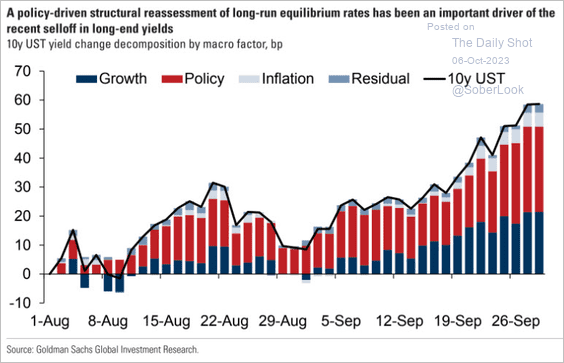 Source: Goldman Sachs; @dailychartbook
Source: Goldman Sachs; @dailychartbook
3. TLT trading volume and open interest in call options surged this week.
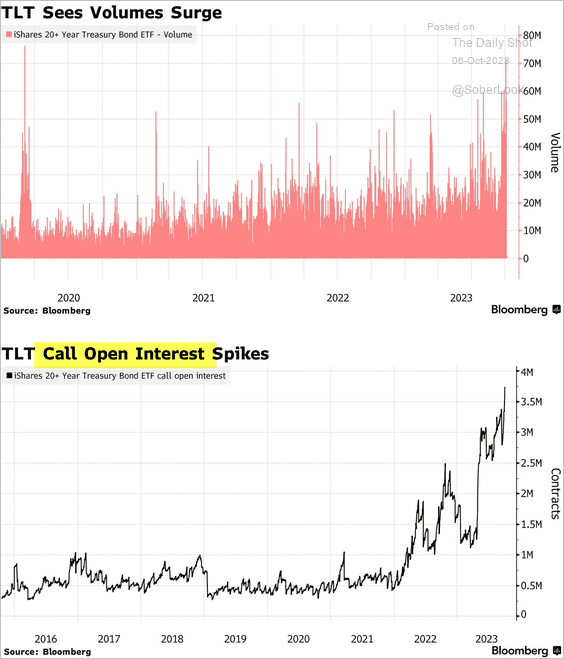 Source: @markets Read full article
Source: @markets Read full article
4. Traders are placing massive bets on the outcome of the November FOMC meeting.
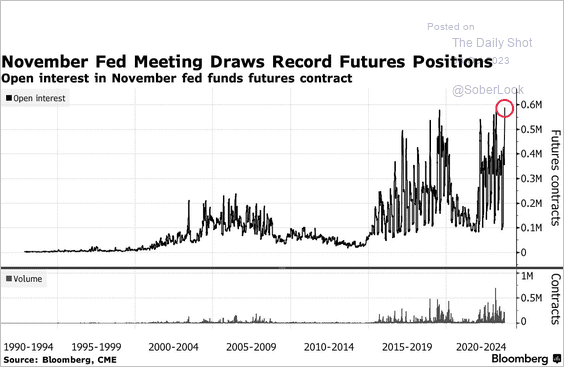 Source: @markets Read full article
Source: @markets Read full article
Back to Index
Global Developments
1. Over the past 15 years, since the initial round of the Fed’s Quantitative Easing, US equities have outperformed other major assets, with commodities trailing behind.
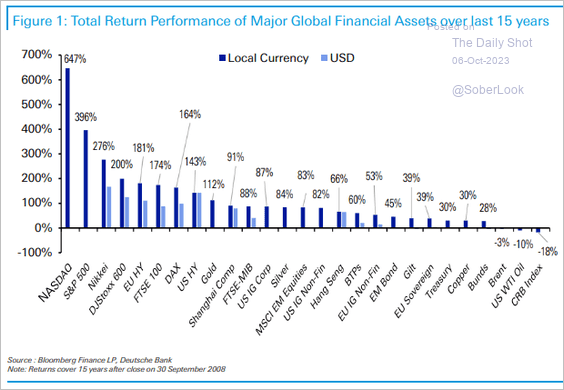 Source: Deutsche Bank Research
Source: Deutsche Bank Research
2. Here is a look at debt-to-GDP ratios in advanced economies.
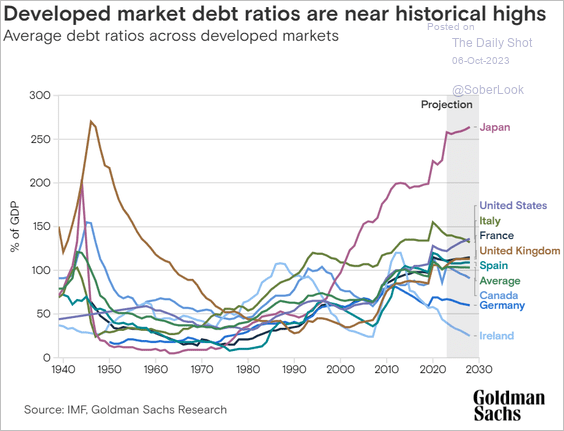 Source: Goldman Sachs
Source: Goldman Sachs
3. This chart shows the GDP per capita relative to the OECD mean.
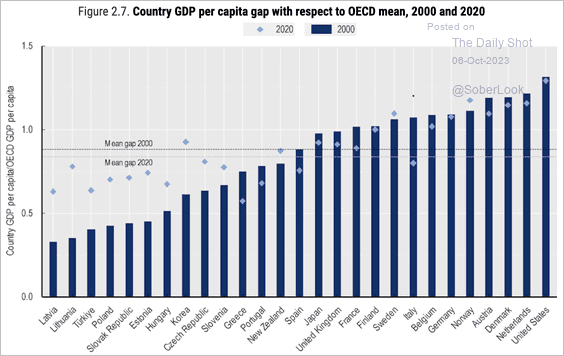 Source: OECD Read full article
Source: OECD Read full article
4. Mexico, Vietnam, India, and the euro area account for a growing share of US goods imports, possibly displacing China.
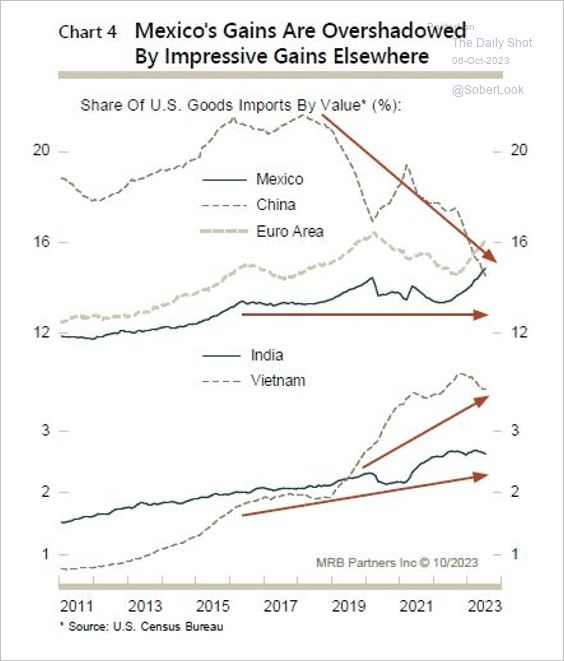 Source: MRB Partners
Source: MRB Partners
——————–
Food for Thought
1. Student loan debt:
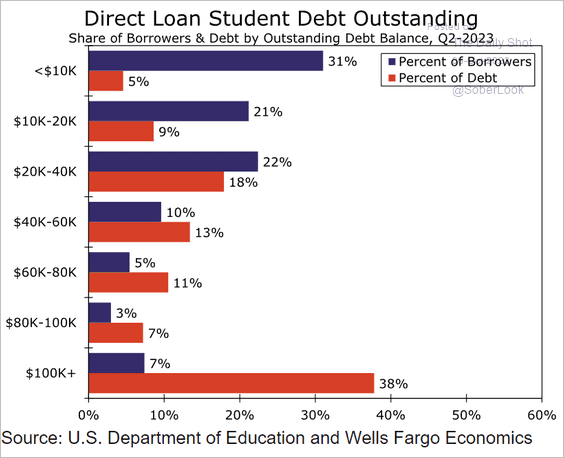 Source: Wells Fargo Securities
Source: Wells Fargo Securities
2. Cigarette prices around the world:
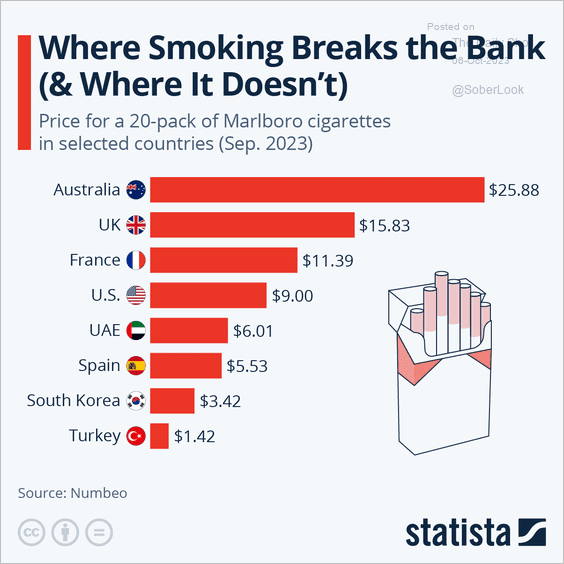 Source: Statista
Source: Statista
• Taxes on cigarettes in the US:
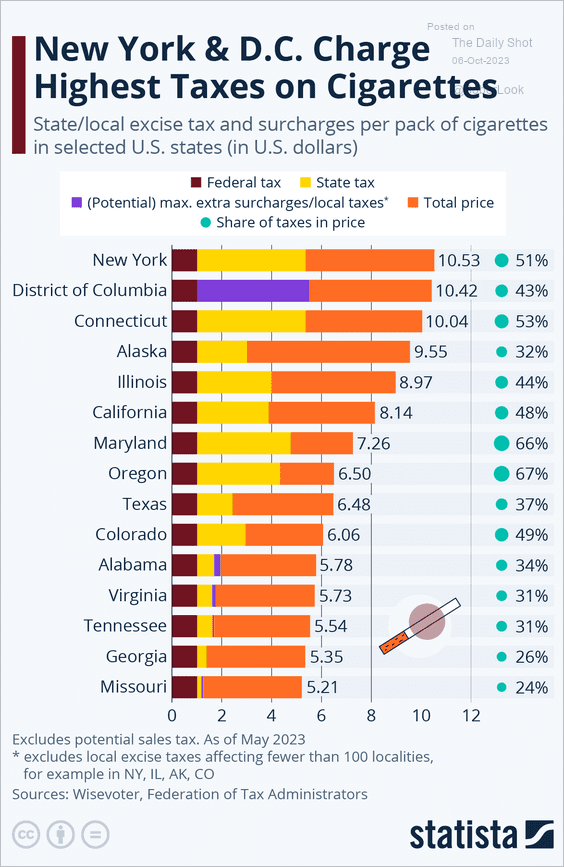 Source: Statista
Source: Statista
——————–
3. Accelerating adoption rates of technologies:
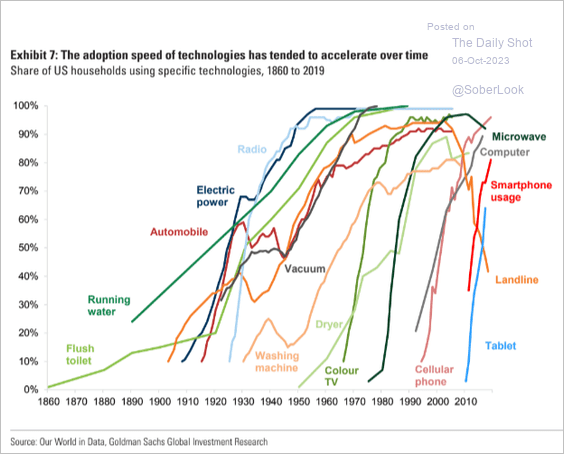 Source: Goldman Sachs; @dailychartbook
Source: Goldman Sachs; @dailychartbook
4. Huawei mobile phone shipments:
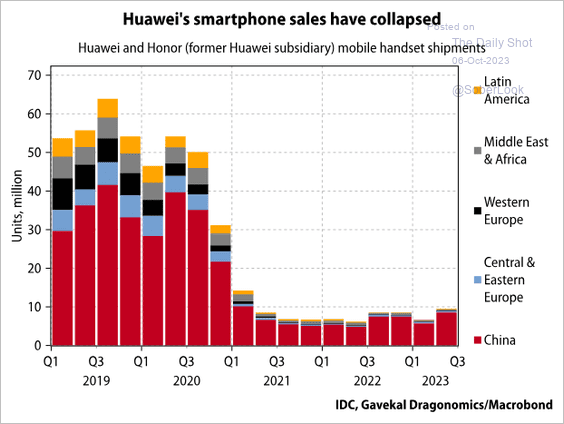 Source: Gavekal Research
Source: Gavekal Research
5. Nuclear warhead inventories:
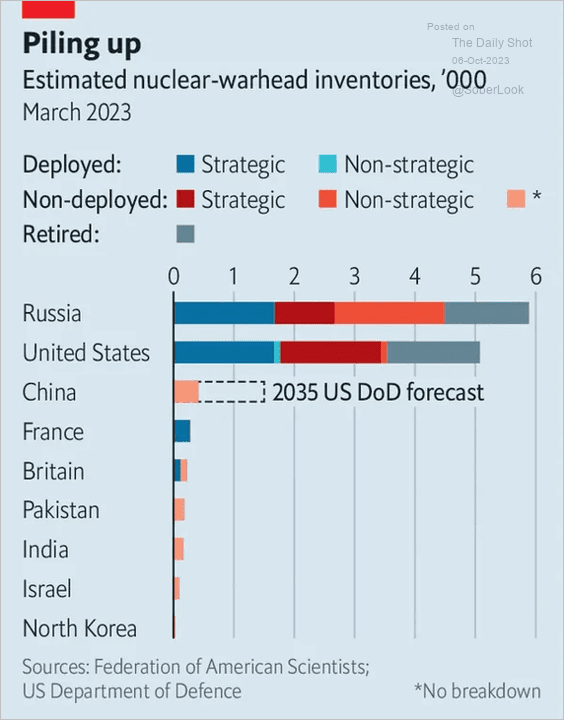 Source: The Economist Read full article
Source: The Economist Read full article
6. Browser market share by region:
 Source: Statista
Source: Statista
7. Which animals are morally acceptable to eat?
 Source: @chartrdaily
Source: @chartrdaily
——————–
Have a great weekend!
Back to Index
